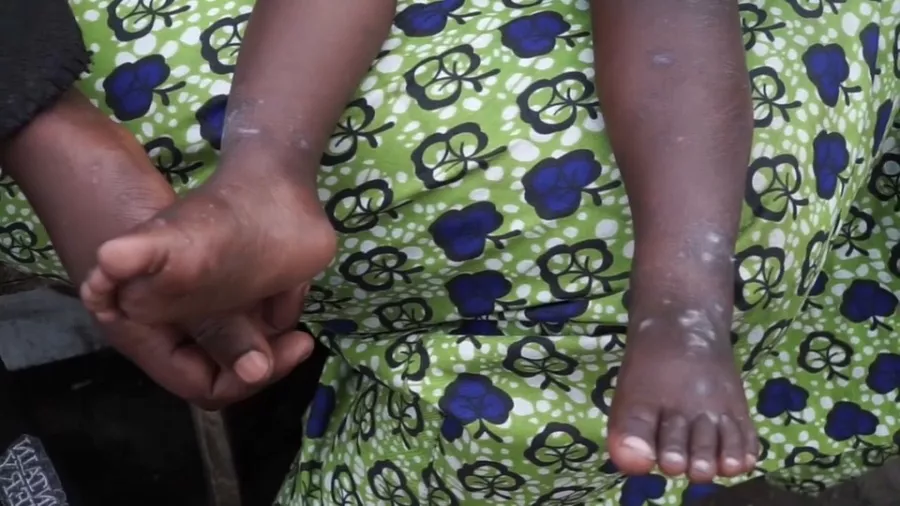New Strain of Mpox Doubles Among Children in DR Congo and Burundi, Raising Alarm
4 min read
A new and more aggressive strain of the mpox virus has rapidly spread in the Democratic Republic of Congo (DRC) and Burundi, causing a sharp rise in cases among children. Save the Children reports that since the public health emergency was declared in mid-August, cases of the fast-moving clade 1b strain have more than doubled, particularly in these two countries, which now account for 92% of all mpox cases in Africa this year.
As of November 3, 2023, the number of suspected mpox cases among children in the DRC had surged by over 130%, from 11,300 to 25,600. In neighboring Burundi, the number of confirmed child cases grew from 89 to nearly 1,100 in the same period. This sharp increase follows the World Health Organization’s declaration of the outbreak as a Public Health Emergency of International Concern on August 14, 2023.
Children at Greatest Risk
The rapidly spreading mpox virus is disproportionately affecting children, who are particularly vulnerable due to multiple factors. The new strain is nearly four times more deadly for children than for adults. In regions where children face extreme hunger, displacement, and limited access to healthcare, the situation is even more dire. Malnourished children, living in areas with poor sanitation and inadequate healthcare systems, have a higher risk of contracting and succumbing to the virus, especially with limited access to critical resources such as testing, vaccines, and medical treatment.
Mpox, which causes fever, body rash, severe headaches, and fatigue, can lead to severe complications. In children, it may cause respiratory issues, and in extreme cases, sepsis—a life-threatening condition that can result from widespread infection. According to the Africa Centers for Disease Control and Prevention (CDC), over 46,000 suspected and confirmed mpox cases have been reported across Africa this year, resulting in more than 1,000 deaths.
Urgent Need for Action
Given the alarming rise in cases among children, there is an urgent need for comprehensive measures to control the outbreak and protect vulnerable populations. Save the Children highlights the specific challenges facing children, who may not fully understand health guidance and are often more likely to come into contact with contaminated surfaces as they explore their environment by touch. It is crucial to provide children with timely information and empower parents to seek immediate medical care if their children become ill.
“The response must include not only medical treatment but also efforts to alleviate children’s fears and anxieties caused by the outbreak,” said a Save the Children spokesperson. “We must support communities in adopting prevention practices while ensuring that children are not stigmatized or discriminated against due to the disease.”
In addition to providing health care and information, addressing the emotional well-being of children is crucial. Helping children feel safe and reducing the stress caused by outbreaks is key to preventing further harm, including the social stigma that can accompany infectious diseases.
Global Lessons from Previous Outbreaks
While the global mpox epidemic of 2022 was mitigated by targeted vaccinations for at-risk groups, similar measures are urgently needed in the DRC and Burundi. These actions should include widespread testing, vaccination campaigns, and awareness-raising efforts to educate the population on how to prevent the disease and where to seek treatment.
The ongoing outbreak in the DRC, in particular, highlights the need for improved health infrastructure, as the country faces significant challenges in managing the crisis. Save the Children has been actively working on the ground in both the DRC and Burundi to combat the outbreak.
Save the Children’s Efforts on the Ground
In the DRC, Save the Children is working with local communities to disseminate accurate information about mpox and dispel misinformation. The organization has also set up systems for identifying and reporting suspected cases and is providing critical resources such as medication, isolation tents, and personal protective equipment (PPE) for healthcare workers. Health centers in the eastern DRC have received vital supplies like beds, bedding, and training for medical staff, equipping them to better handle the surge in cases.
In Burundi, Save the Children is collaborating closely with the Ministry of Health and the Department of Emergency Response (COUSP) to strengthen the country’s response. The focus in Burundi is on reducing the spread of the virus, particularly among vulnerable refugee populations, and improving local healthcare capacity to manage the outbreak effectively. Save the Children’s Emergency Health Unit has deployed specialists in clinical care, water and sanitation, and operations to ensure that Burundi’s health system is better equipped to handle the crisis.
A Call for Continued International Support
The situation in both the DRC and Burundi remains dire, and continued international support is essential to contain the outbreak. Save the Children urges the international community to invest in both immediate healthcare resources and long-term solutions to strengthen healthcare infrastructure in these high-risk countries.
Without prompt intervention, the spread of mpox could lead to even greater suffering, particularly among children. The global community must come together to support these efforts and prevent further loss of life.






